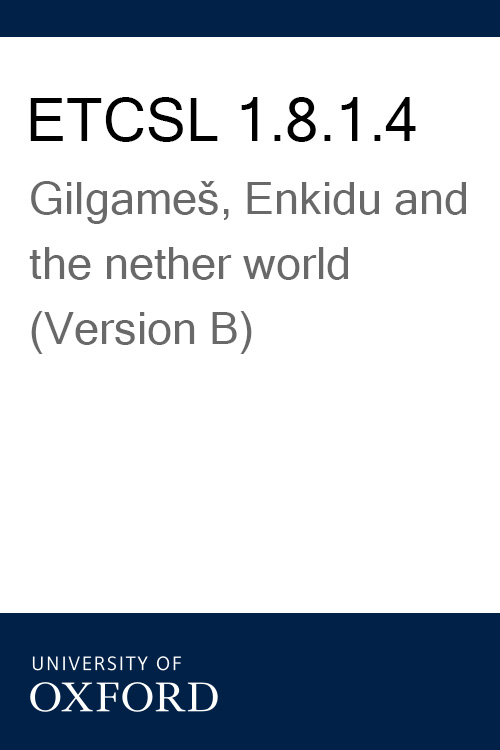Text summary
From: Website · Jeremy Allen Black · 1997

Text: Full Translation, Collation (partial)
Sumerian ⟶ English a
| Line # | Translation |
|---|---|
| [Version B] A version from Urim (UET 6 58) | |
| 1-7 | "Did you see him who fell down from the roof?" "I saw him." "How does he fare?" "They cannot …… his bones." "Did you see him who was struck in (?) a flood-storm of (?) Iškur?" "I saw him." "How does he fare?" "He twitches like an ox as the worms eat at him." "Did you see the leprous man?" "I saw him." "How does he fare?" "His food is set apart, his water is set apart, he eats the food offered (?) to him, he drinks the water offered (?) to him. He lives outside the city." |
| 8-19 | "Did you see him who had no respect for the word of his mother and father?" "I saw him." "How does he fare?" " "O my body! O my limbs!" he never ceases to cry." "Did you see him who was reached by the curse of his mother and father?" "I saw him." "How does he fare?" "He is deprived of an heir. His spirit roams about." "Did you see him who …… the name of his god?" "I saw him." "How does he fare?" "His spirit ……." "Did you see the spirit of him who has no funerary offerings?" "I saw him." "How does he fare?" "He eats the scraps and the crumbs …… tossed out in the street." "Did you see my little stillborn children who never knew existence?" "I saw them." "How do they fare?" "They play at a table of gold and silver, laden with honey and ghee." "Did you see him who was set on fire?" "I did not see him. His smoke went up to the sky. His spirit does not live in the underworld." |
| 20-28 | "Did you see him who lied to the gods while swearing an oath?" "I saw him." "How does he fare?" "He drinks …… which has been drunk …… the libation place at the entrance (?) to the nether world." "Did you see the citizen of Ĝirsu who refused (?) water to his father and his mother?" "I saw him." "How does he fare?" "In front of each of them are a thousand Martu, and his spirit can neither …… nor ……. The Martu at the libation place at the entrance (?) to the nether world ……." "Did you see the citizens of Sumer and Akkad?" "I saw them." "How do they fare?" "They drink the water of the …… place, muddy water." "Did you see where my father and my mother live?" "I saw them." "How do they fare?" "Both of them drink the water of the …… place, muddy water." |
| [Version B] Another version from Urim (UET 6 59) | |
| Segment A | |
| 1-9 | "Did you see him hit by a ship's board? How does he fare?" " "Alas, my mother!" the man cries to her, as he pulls out ……, he …… crossbeam …… crumbs." "Did you see him who fell down from the roof? How does he fare?" "He twitches like an ox as the worms eat at him." "Did you see him who was reached by the curse of his mother? How does he fare?" "He is deprived of an heir. His spirit roams (?) about." "Did you see him who had no respect for the word of his father and his mother? How does he fare?" |
| 1 line fragmentary | |
| unknown no. of lines missing | |
| Segment B | |
| 1-11 | "His food is set apart, his water is set apart, he eats the food offered (?) to him, he drinks the water offered (?) to him." "Did you see him who fell in battle? How does he fare?" "His father and mother are not there to hold his head, and his wife weeps." "Did you see him who ……? How does he fare?" "…… from his (?) hand ……." "Did you see the spirit of him who has no funerary offerings? How does he fare?" "He eats the scraps and the crumbs tossed out in the street." "Did you see my little stillborn children who never knew existence? How do they fare?" "They play with a bucket of gold and silver, full of honey and ghee." "Did you see him who was set on fire?" "I did not see him. His spirit is not there. His smoke went up to the sky." |
| Source(s) a Black et al., "ETCSL 1.8.1.4: Gilgameš Nether World [Version B]." | |
Record notes
About these data
| Catalog no. | ETCSL 1.8.1.4 (B) |
| Retrieval date | Jun. 15, 2020 |
| Copyright | ETCSL @ Oxford |
Cite this page
OMNIKA Foundation Contributors. "ETCSL 1.8.1.4 (Version B): Gilgamesh, Enkidu and the Nether World." OMNIKA – World Mythology Index, OMNIKA Foundation, 15 Jun. 2020, omnika.org/stable/631. Accessed 24 Feb. 2026.
OMNIKA (2020, June 15). ETCSL 1.8.1.4 (Version B): Gilgamesh, Enkidu and the Nether World. Retrieved from https://omnika.org/stable/631
OMNIKA Foundation Contributors. "ETCSL 1.8.1.4 (Version B): Gilgamesh, Enkidu and the Nether World." Las Vegas, NV: OMNIKA Foundation. Created June 15, 2020. Accessed February 24, 2026. https://omnika.org/stable/631.





